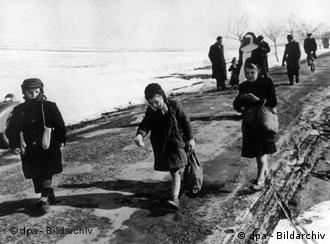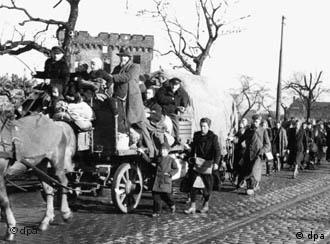
Expellees from Poland arrive in Germany. Many Germans expellees left houses behind
Poland's Kaczynski Wants to Stop German Land Claims
dwelle
Poland's Prime Minister Jaroslaw Kaczynski wants to close loopholes that allow German expellees to reclaim land lost after World War II in Poland. Poles should not have to worry about losing their property, he said.
Millions of ethnic Germans found themselves living in Poland after World War II when the Potsdam Agreement in 1945 expanded Poland's border 200 kilometers (124 miles) west, and many of them were expelled from the country, leaving their homes and land behind. The property belonging to the expellees was given to Poles who themselves were made homeless by shifting borders after parts of eastern Poland were annexed to the Soviet Union.
All told, 12 million to 14 million ethnic Germans were victims of mass expulsions from Poland, the Czech Republic and other countries in Eastern Europe. Many are represented by groups like the Prussian Trust, which has brought compensation claims against Poland to the European Court of Human Rights in Strasbourg.
The German government does not support lawsuits by its citizens and Germany dropped all territorial claims in Poland as part of a 1990 treaty, but the issue is one of many, including a German-Russian gas pipeline planned to be built across the Baltic Sea, that has made for tense relations between Warsaw and Berlin.
Some Germans have regained property
Cases have been brought by Germans who left Poland as late as the 1970s, fleeing the then-communist country. Some Germans who were expelled recently launched attempts to regain their property. A group of more than 20 Germans or their descendants have filed property claims with the Strasbourg court. Some have also won cases in the Polish civil courts.

Prime Minister Jaroslaw Kaczynski at a news conference said he wants legal security for Poles
Kaczynski said he wants the property rights matter settled "once and for all."
"Those [Poles] who took over property in good faith, as a result of events tied to Germans leaving Poland, even those so-called late-departures, must have 100 percent certainty that their situation is secure and nothing threatens them," he said Thursday.
Poles resent property claims
Polish citizens shouldn't have to worry "that somebody could come take his land away because sometime in the 1970s it belonged to someone else," Kaczynski added.
The cases have also caused uncertainty and resentment among Poles who have settled the area and Polish politicians have accused Germany of trying to rewrite history by portraying Germans as the victims of Polish expulsions.
Kaczynski visited the northern town of Narty on Thursday and spoke with residents there. He held a press conference from the yard of a red brick house that belongs to Zdzislaw and Lucja Lunskis. They are appealing a recent Polish court decision that would return their house to its previous German owners.
Kaczynski wants to close these "loopholes" by updating the register and transforming lease agreements into deeds.
"We will aim to bring changes in the law which in the end will prevent these types of decisions," Kaczynski said.
Domestic political issue
Kaczynski was critical of several recent Polish court decisions which sided with German landowners.

German expellees head west in carts and by foot after World War II
"It is clear that the courts' responsibility is to act in line with Poland's national interest," Kaczynski said.
While a handful Polish homeowners have been forced to give up their property, the issue could become a political tool for Kaczynski's Law and Justice Party to show its patriotism in a possible election where it will compete with its junior coalition party, the League of Polish Families.
The land claims are one of many issues which have caused tension between Poland and Germany. Relations between the two are the worst in years, with Kaczynski using Poland's suffering under the Nazis as leverage during EU treaty negotiations last month.
Article based on news reports (th)

No comments:
Post a Comment